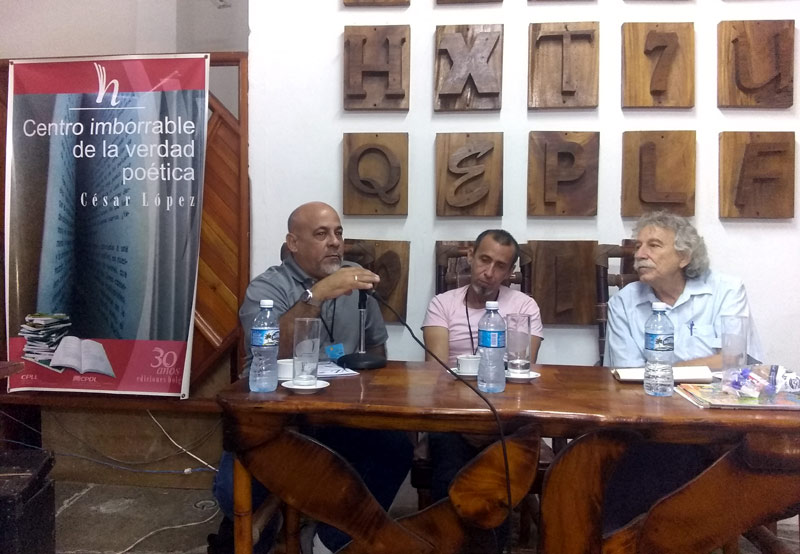Letters in Code of Revolution
- Written by Rosana Rivero Ricardo
- Published in Culture
- Hits: 10015
 Photo: By the author.
Photo: By the author.Ediciones Holguin, temple of the letters of this "province of the Universe", as it was described by its director, the writer Lourdes Gonzalez, hosts the Professional Program of the Book Fair, a space that stands as the backbone of this event.
On March 21, the publisher brought together the writers Manuel Garcia Verdecia, Rogelio Riveron and Juan Carlos Santana to talk about "Literature in times of Revolution", on the occasion of the 60th anniversary of the triumph of the Cuban Revolution on January 1959.
Garcia Verdecia, renowned editor and translator, offered an overview of the last six decades of Cuban literature, marked by the revolutionary triumph. He argued that the influence on the letters of this fact, not only was remarkable from the thematic point of view, because there was a renewal of the ways of doing in terms of style.
"Literature and the Revolution in this period have gone from idyll to a gentle disagreement, where literary productions are more analytical, reflective and critical," said Garcia Verdecia, before highlighting those authors who, by gender, are the most representative since his opinion.
In poetry he commented on the adherence of poets to a more direct style, marked by orality, aspects that characterized the work of some creators such as Roberto Fernandez Retamar and Fayad Jamiz.
In the narrative he highlighted the incorporation of the sensuality of the words and the themes addressed by the Latin American writers. In his discourse, he recognized as exponents Guillermo Cabrera Infante for his "Así en la paz como en la guerra"; Jesus Diaz, with "Los años duro"; Eduardo Heras Leon -to whom the Book Fair is dedicated- for his volumes " La guerra tuvo seis nombres"," Los pasos en la hierba "and" Acero ", and Onelio Jorge Cardoso, who gave relevance to the Cuban storytelling.
He also addressed the development of the novel, genre in which he remarked the voices of Jose Soler Puig, Lisandro Other, Samuel Feijo, Edmundo Desnoes, among others.
He also spoke on the development of detective literature and the testimony novel started in Cuba by Pablo de la Torrente Brau and that Miguel Barnet later cultivated with his classics "Biografía de una cimarrón" and "Canción de Rachel".
Rogelio Riveron highlighted the work of women in the literature of the Island, with such prominent voices as Dulce Maria Loynaz, Fina Garcia Marruz, Dora Alonso and Cleva Solis.
He also referred to three fundamental exponents of Cuban literature such as Virgilio Piñera, Alejo Carpentier and Jose Lezama Lima, who produced great works about which the Cuban Revolution did not influenced.
The closing speech was in charge of Juan Carlos Santana, who focused on the development of the printing industry and publishers, which drove the access of Cubans to literature and, therefore, the diffusion of the habit of reading.
"The emergence of the National Print was the seed of the creation of the Cuban Book Institute and, later, of the publishers. This led to a uniform development of publications in Cuba, " Santana said.
He added that "when everyone thought that there was nothing to invent in the literary development of the country, Fidel's idea was born in 2000 of creating the System of Territorial Editions, in which Cuban literature finds the opportunity to become perpetual and recognized. "
He also highlighted the importance of the work of the editor and praised the school of translators that currently gives prestige to the island.
Santana concluded that throughout the year Cuba develops literary events, which start with the International Book Fair of Havana and continues with its projection in the rest of the provinces of the country. Then the Book Fair in the Mountain, the Summer Readings and the University Festivals of Book and Literature.
